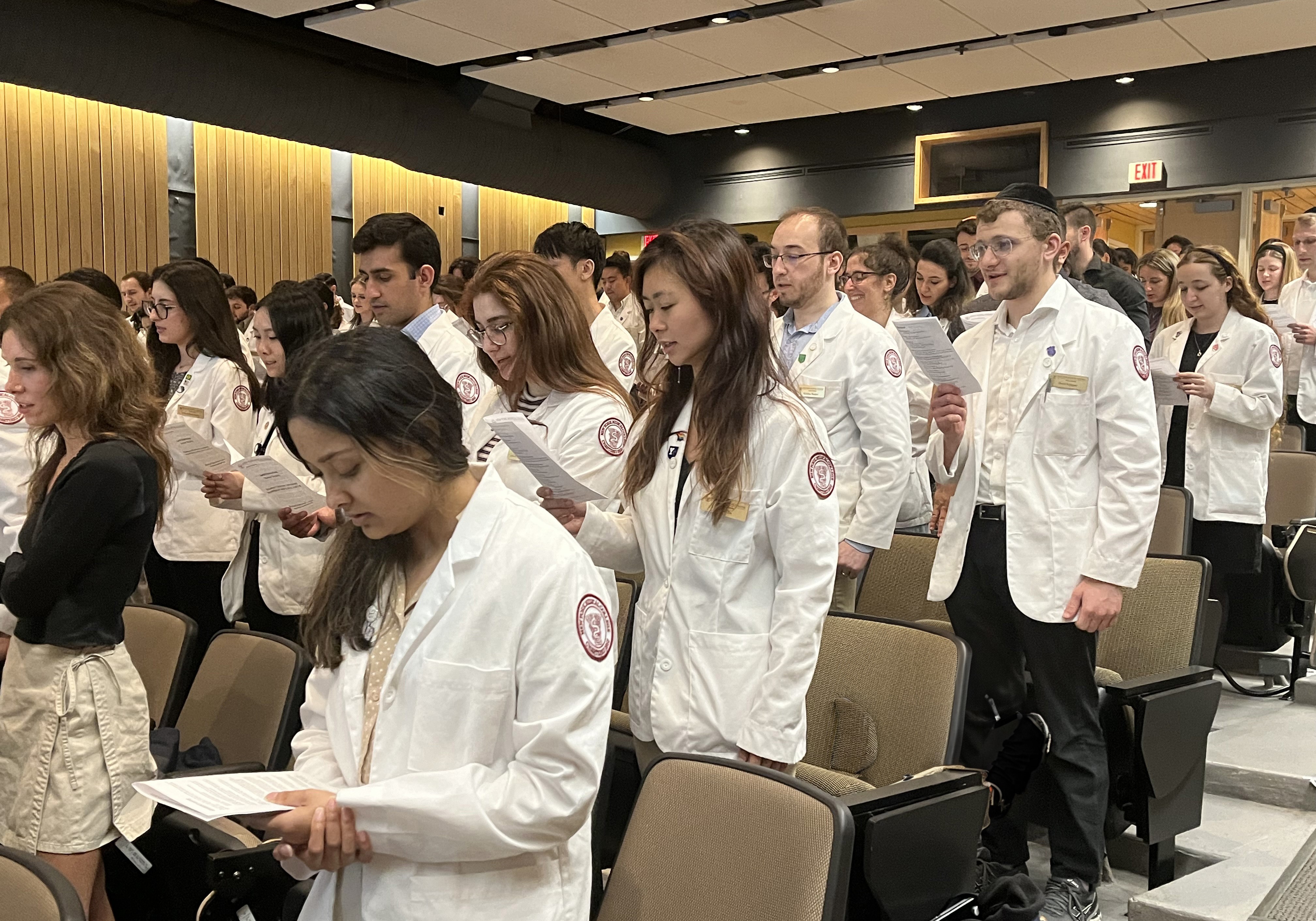
School of Medicine Class of 2026 Embarks on Clinical Years
Burn Surgeon and Alumna Dr. Rachelle Lodescar Urged Students to Demonstrate Compassion During Keynote Address

Members of the Class of 2026 marked the start of their clinical years on May 8, at a special ceremony in the John W. Nevins, M.D. '44 Auditorium. The Student Clinician Ceremony, an annual tradition in the School of Medicine (SOM), was created by the Gold Humanism Honor Society to celebrate the important transition from pre-clinical to clinical years in medical school. During the event, the students recited the pledge they created for their White Coat Ceremony at the start of their medical education journey at New York Medical College (NYMC).
Neil W. Schluger, M.D., SOM dean, spoke of the importance of patients knowing that their physicians are completely committed to their well-being: “We live in a time now where in every sphere of life, people are being torn apart and not pulled together. Patients must know that when we look at them what we see is their humanity and that's the only thing that we see. We don't see a person who comes from a place that we don't come from, speaks a language that we don't speak, worships at a place where we don't worship, or votes for people that we don't vote for. Look for what you have in common with that person, not what differences you have, and have that same approach with your colleagues. When you're standing next to someone in the ICU or the operating room, or the emergency room recognize that person has the same desire as you do and trust that you are both doing the best you can for your patients.”
The keynote address was delivered by NYMC alumna Rachelle Lodescar, M.D. ’13, assistant professor of surgery at NYMC, and a burn surgeon at Westchester Medical Center (WMC). “My job may seem gory, intense, and sad at times with the tough cases that I deal with, especially with children and very bad injuries, but I experience firsthand a chance to help people when they're at their worst, and I can be a source of light in someone’s darkest of times,” shared Dr. Lodescar. “Each time I meet a new burn victim, my approach requires sensitivity, empathy, and compassion because, for some, this is their rebirth to a new life, and the burn unit is where they learn to start living again. I can't feel what they're feeling, but I can try to walk in their shoes. My job does not end after fixing their burn injuries through surgeries, but it also includes everything that will aid them in their recovery.”
“Take time to explain and answer their questions. Use layman’s terms, not medical jargon. Be sure they understand the plan and they agree with the course of action. Use translators in their native language. Be realistic about prognosis and outcomes. Even if it's a very poor outcome. Never lie and gain the trust of your patients,” advised Dr. Lodescar. “At the end of the day, they will appreciate your honesty rather than providing them with false reassurance. It is crucial to provide emotional support during treatment and recovery. We often forget that as health care providers, we are viewed as a source of comfort, and we can alleviate our patients' fears simply by being present, even if you feel as a medical student, you may not be making a significant impact on a patient’s care, you do matter.”
During the event, resident physicians from WMC and Maria Fareri Children’s Hospital (MFCH) who were selected by the outgoing third-year class, were honored for demonstrating exceptional humanistic qualities in the care of patients, including compassion, empathy, professionalism, and service, as well as going above and beyond in role as teachers to medical students. The 2024 Humanism and Excellence in Teaching Award recipients included: Rizwan Amin, M.D., psychiatry, WMC; Autumn Brewer, M.D., obstetrics and gynecology, WMC; Tyler D’Agostino, M.D. ’22, surgery, WMC; Terry Park, M.D., neurology, WMC; Angela Wang-Negri, M.D., pediatrics, MFCH; and Zhimin Xu, M.D., neurology, WMC.

